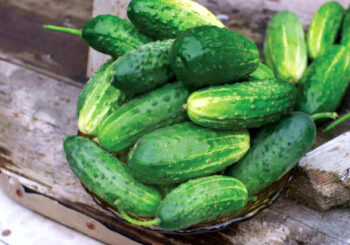By Sayer Ji
Contributing writer for Wake Up World
Eat them raw and you get a juicy crunch. Cucumbers, however, do more than just serve as a refreshing feature of salads, sandwiches, slaws, pickles, noodles, cocktails and more. This popular produce pick, a member of the Cucurbitaceae family along with melon, squash and pumpkins, has been used in traditional medicine since ancient times for its unnumbered health benefits.
[pro_ad_display_adzone id=”110028″]
Cucumber is rich in polyphenols and cucurbitacins, plant compounds that are known to be antioxidant, anti-carcinogenic, anti-inflammatory, anti-hyperglycemic, diuretic, antimicrobial and analgesic, to name a few.[i] Here are 18 of its valued medicinal wonders.
18 Health Benefits of Cucumber
1. Keeps you hydrated. Cucumber is approximately 96% water, so it can be particularly effective at promoting hydration and helps you meet your daily fluid intake needs.[ii]
2. Useful for weight loss. Each half-cup serving of cucumber offers just 7.8 calories.[iii]In an analysis, consuming high-water, low-calorie foods was linked to a significant reduction in body weight.[iv]
3. Eases osteoarthritis pain. In a study, using 10 milligrams (mg) of an aqueous extract of cucumber twice daily proved effective in reducing pain related to moderate knee osteoarthritis and can be used to address knee pain, stiffness and physical functions related to the condition.[v]
Osteoarthritis, caused by wear and tear on the joints, presently has no known cure and is conventionally managed through high doses of painkillers and anti-inflammatory drugs that often come with side effects.
4. Helps treat liver damage. Heat-treated cucumber juice showed a significant protective benefit on alcohol detoxification among animal subjects, suggesting a potential use in treating liver injury due to excess alcohol consumption.[vi]
5. May lower blood sugar. A number of animal studies show that cucumber may effectively reduce and control blood sugar levels.[vii] Another study induced diabetes in animal subjects, provided them with cucumber peel extract and found that the peel reversed most of the changes associated with diabetes, causing a reduction in blood sugar.[viii]
6. Acts as a skin whitener. An active component in cucumber leaves may have an inhibitory effect on melanin production and is a potentially useful skin whitening agent.[ix]
7. Anticancer effects. The aqueous extract of cucumber contains bioactive compounds that exert anticancer activity.[x] “Our conclusion supports additional in-depth study of this pharmacologic activity as a malignant tumor agent,” wrote the researchers.
8. Promotes regular bowel movement. Cucumbers are water-rich and help prevent dehydration, a major risk factor for constipation. Staying properly hydrated can improve stool consistency as well as regularity.[xi] The seeds, while having a cooling effect on the body, are used to prevent constipation.[xii]
9. Soothes skin. Cucumber is known for its soothing effect on skin irritations and its ability to reduce swelling.[xiii] It also has the power to alleviate pain from sunburn.
10. Helps prevent wrinkles. A clinical trial showed that cucumber juice can be an effective skin care ingredient as it helps prevent wrinkles by restoring the natural elasticity of skin.[xiv]
11. Potent anti-inflammatory. An iminosugar amino acid in cucumber, called idoBR1, may function as an anti-inflammatory agent and its importance in the diet therefore warrants further investigation, according to a 2020 study.[xv]
[pro_ad_display_adzone id=”110030″]
12. Supports bone health. A half-cup serving provides 8.53 µg of vitamin K.[xvi] Based on a review of the current literature, supplementing with vitamin K1 (the type found in cucumbers) and K2 can reduce the incidence of fractures among postmenopausal women.[xvii]
13. Serves as a natural eye mask. Research suggests that applying cucumber to your eyes can impart a cooling effect on skin, hydrate the eyes and surrounding areas and help reduce dark circles due to its vitamin K levels.[xviii]
14. Supports cardiovascular health. Cucurbitacins in cucumber may prevent atherosclerosis, on top of tested effectiveness against inflammation, cancer and diabetes.[xix]
15. Slashes mortality risk. Beta-carotene, found abundantly in cucumber, is an important pro-vitamin A carotenoid. A meta-analysis showed that dietary or circulating beta-carotene was inversely associated with risk of all-cause mortality, citing the possibility of extending human lifespan.[xx]
16. Helps combat prostate cancer. Cucurbitacin B, a naturally occurring compound in cucumber and other vegetables, significantly and specifically inhibited prostate cancer cell growth.[xxi]
17. Protects against diabetes complications. In a study, cucumber was able to prevent oxidative stress and carbonyl stress, considered a safe and suitable way to protect against the complications typically observed in diabetes.[xxii]
18. Supports brain function. Fresh cucumbers were ground and turned into a paste of varying concentrations.[xxiii] The conclusion: They helped increase cognition in animal models.
References:
[i] Uthpala T et al “Nutritional Bioactive Compounds and Health Benefits of Fresh and Processed Cucumber (Cucumis Sativus L.)” 2020 Sept. DOI:10.13140/RG.2.2.17510.04161
[ii] Guelinckx I et al “Contribution of Water from Food and Fluids to Total Water Intake: Analysis of a French and UK Population Surveys” Nutrients. 2016 Oct; 8(10): 630. Epub 2016 Oct 14.
[iii] USDA FoodData Central, Cucumbers https://fdc.nal.usda.gov/fdc-app.html#/food-details/168409/nutrients
[iv] Stelmach-Mardas M et al “Link between Food Energy Density and Body Weight Changes in Obese Adults” Nutrients. 2016 Apr; 8(4): 229. Epub 2016 Apr 20.
[v] Nash R et al “Effectiveness of Cucumis sativus extract versus glucosamine-chondroitin in the management of moderate osteoarthritis: a randomized controlled trial” Clin Interv Aging. 2018 ;13:2119-2126. Epub 2018 Oct 25.
[vi] Bajpai V et al “Protective effect of heat-treated cucumber (Cucumis sativus L.) juice on alcohol detoxification in experimental rats” Pak J Pharm Sci. 2016 May;29(3 Suppl):1005-9.
[vii] Roman-Ramos R et al “Anti-hyperglycemic effect of some edible plants” J Ethnopharmacol. 1995 Aug 11;48(1):25-32.
[viii] Dixit Y et al “Protective role of three vegetable peels in alloxan induced diabetes mellitus in male mice” Plant Foods Hum Nutr. 2010 Sep;65(3):284-9.
[ix] Kai H et al “Inhibitory effect of Cucumis sativus on melanin production in melanoma B16 cells by downregulation of tyrosinase expression” Planta Med. 2008 Dec;74(15):1785-8. Epub 2008 Nov 13.
[x] Tuama A et al “Phytochemical screening and in vitro antibacterial and anticancer activities of the aqueous extract of Cucumis sativus” Saudi J Biol Sci. 2019 Mar ;26(3):600-604. Epub 2018 Jul 31.
[xi] Popkin B et al “Water, Hydration and Health” Nutr Rev. 2010 Aug; 68(8): 439-458.
[xii] Mukherjee P et al “Phytochemical and therapeutic potential of cucumber” Fitoterapia. 2013 Jan;84:227-36. Epub 2012 Oct 23.
[xiii] Mukherjee P et al “Phytochemical and therapeutic potential of cucumber” Fitoterapia. 2013 Jan;84:227-36. Epub 2012 Oct 23.
[xiv] Nema N et al “Cucumis sativus fruit-potential antioxidant, anti-hyaluronidase, and anti-elastase agent” Arch Dermatol Res. 2011 May;303(4):247-52. Epub 2010 Dec 14.
[xv] Nash R et al “Iminosugar idoBR1 Isolated from CucumberReduces Inflammatory Activity” ACS Omega. 2020 Jul 7 ;5(26):16263-16271. Epub 2020 Jun 23.
[xvi] USDA FoodData Central, Cucumbers https://fdc.nal.usda.gov/fdc-app.html#/food-details/168409/nutrients
[xvii] Iwamoto J et al “High-dose vitamin K supplementation reduces fracture incidence in postmenopausal women: a review of the literature” Nutr Res. 2009 Apr;29(4):221-8.
[xviii] Murad H et al “Evaluating the Potential Benefits of Cucumbers for Improved Health and Skin Care” JARLIFE.
[xix] Kaushik U et al “Cucurbitacins – An insight into medicinal leads from nature” Pharmacogn Rev. 2015 Jan-Jun; 9(17): 12-18.
[xx] Zhao L et al “Dietary, circulating beta-carotene and risk of all-cause mortality: a meta-analysis from prospective studies” Sci Rep. 2016; 6: 26983. Epub 2016 May 31.
[xxi] Gao Y et al “Inactivation of ATP citrate lyase by Cucurbitacin B: A bioactive compound from cucumber, inhibits prostate cancer growth” Cancer Lett. 2014 Jul 10 ;349(1):15-25. Epub 2014 Mar 29.
[xxii] Heidari H et al “Protective mechanisms of Cucumis sativus in diabetes-related models of oxidative stress and carbonyl stress” Bioimpacts. 2016 ;6(1):33-9. Epub 2016 Mar 28.
[xxiii] Kumar M et al “Pharmacological Evaluation of Cucumber for Cognition Enhancing Effect on Brain of Mice” Pharmacognosy Journal. 2014;6(3):100-107.
About the author:
Sayer Ji is the founder of Greenmedinfo.com, a reviewer at the International Journal of Human Nutrition and Functional Medicine, Co-founder and CEO of Systome Biomed, Vice Chairman of the Board of the National Health Federation, and Steering Committee Member of the Global Non-GMO Foundation.
© 2020 GreenMedInfo LLC. This work is reproduced and distributed with the permission of GreenMedInfo LLC. Want to learn more from GreenMedInfo? Sign up for their newsletter here.
[pro_ad_display_adzone id=”110027″]








